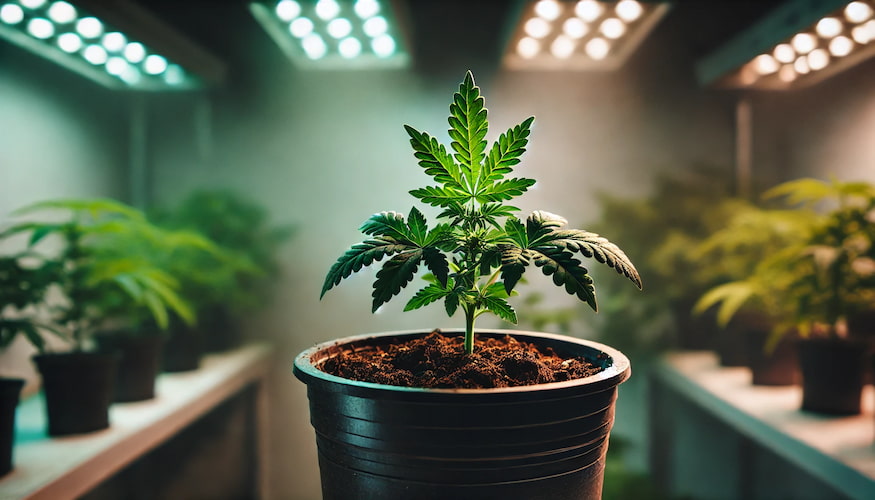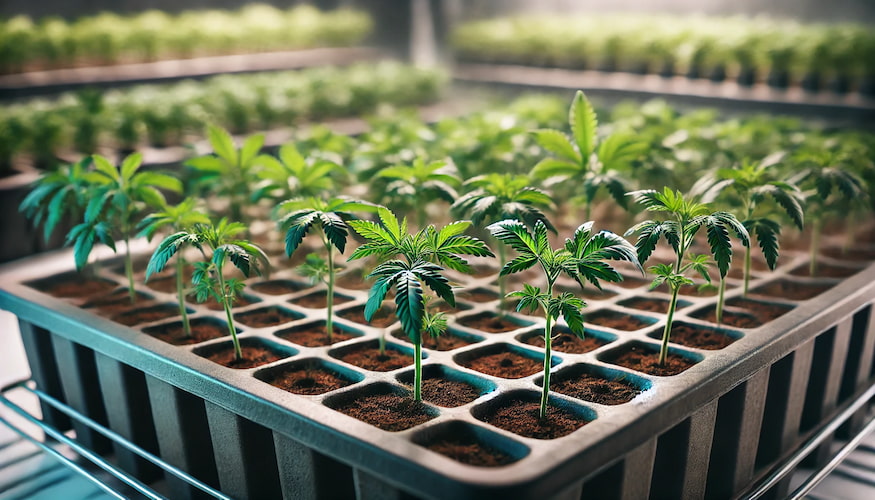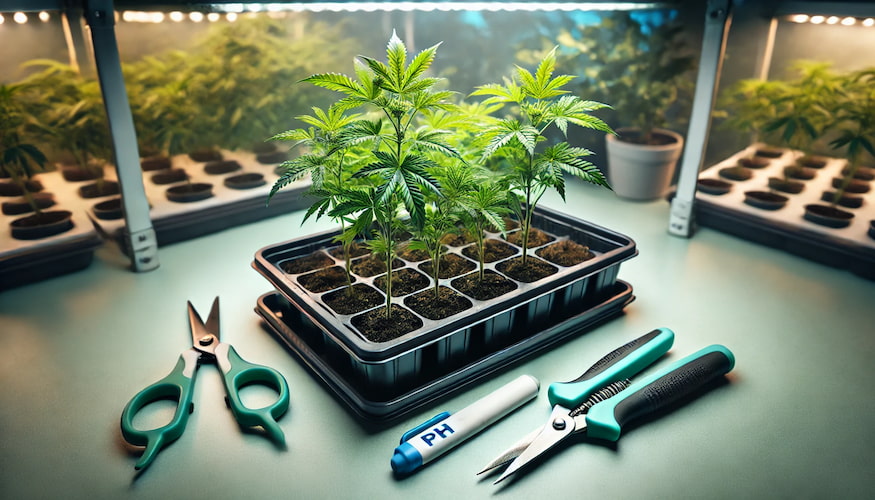Proper nutrition is crucial for the health and development of your cannabis clones. However, feeding clones is a delicate process that requires careful timing and the right balance of nutrients. This comprehensive guide will walk you through the steps of feeding your new clones, ensuring they receive the perfect nutrition for robust growth.
James Bean, CEO of SeedsHereNow.com, emphasizes the importance of proper clone nutrition: “Feeding clones is an art form. Too little, and they starve; too much, and you risk nutrient burn. Finding that sweet spot is key to developing strong, healthy plants.”
Understanding Clone Nutritional Needs
Before diving into the feeding schedule, it’s essential to understand that clones have different nutritional needs compared to mature plants:
- Clones are sensitive and can easily suffer from nutrient burn
- They require a gradual introduction to nutrients
- The focus is initially on root development rather than vegetative growth
Pre-Feeding Stage: Days 1-7
During the first week, your clones don’t need any additional nutrients. They’re focused on developing roots and are still using the resources stored in their leaves.
Steps:
- Use only pH-balanced water (5.8-6.2 for hydro, 6.0-6.5 for soil)
- Maintain high humidity (70-80%)
- Provide gentle lighting (18-24 hours of low-intensity light)
Beginning Feeding: Days 8-14
You can start introducing very mild nutrients around the end of the first week or the beginning of the second.
Steps:
- Prepare a nutrient solution at 1/4 strength of what you’d use for mature plants
- Use a balanced, clone-specific nutrient formula (e.g., 2-1-2 NPK ratio)
- Feed once, then return to pH-balanced water for the next 2-3 waterings
- Monitor closely for any signs of nutrient burn or deficiency
Dr. Emily Rodriguez, cannabis horticulturist, advises: “Start with less than you think you need. You can always add more, but it’s harder to correct nutrient burn in sensitive clones.”
Gradual Increase: Weeks 3-4
As your clones develop stronger roots and show new growth, you can gradually increase nutrient strength.
Steps:
- Increase to 1/2 strength nutrient solution
- Feed every other watering
- Continue using a balanced vegetative formula
- Monitor EC (Electrical Conductivity) if possible, aiming for 0.8-1.2 mS/cm
Full Feeding Schedule: Beyond Week 4
Once your clones are established and showing vigorous growth, you can transition to a regular feeding schedule.
Steps:
- Use full-strength vegetative nutrient formula
- Feed every watering, occasionally flushing with plain pH-balanced water
- Adjust EC based on plant response, typically 1.2-1.6 mS/cm for vegetative growth

Nutrient Guide by Growth Stage
| Growth Stage | Nutrient Strength | Frequency | Key Nutrients |
|---|---|---|---|
| Days 1-7 | No nutrients | N/A | N/A |
| Days 8-14 | 1/4 strength | Once/week | Balanced NPK |
| Weeks 3-4 | 1/2 strength | Every other watering | Higher N |
| Week 5+ | Full strength | Every watering | Complete veg formula |
Essential Nutrients for Cannabis Clones
- Nitrogen (N): Crucial for leaf and stem growth
- Phosphorus (P): Supports root development
- Potassium (K): Enhances overall plant health and stress resistance
- Calcium (Ca): Strengthens cell walls
- Magnesium (Mg): Essential for chlorophyll production
Choosing the Right Nutrient Formula
When selecting nutrients for your clones, consider:
- Type of Growing Medium: Soil, coco coir, or hydroponic systems have different requirements
- Brand Reputation: Stick to well-known, cannabis-specific nutrient lines
- Simplicity: As a beginner, opt for simple 2-part or 3-part nutrient systems
- Organic vs. Synthetic: Both can be effective; choose based on your growing philosophy
“For new growers, I recommend starting with a simple, well-balanced nutrient line specifically designed for cannabis,” suggests Jack Greenthumb, master grower at Emerald Valley Farms.
Signs of Nutrient Issues to Watch For
Nutrient Deficiency:
- Yellowing leaves (especially older leaves)
- Slow growth
- Weak stems
Nutrient Burn:
- Leaf tip browning or curling
- Dark green, clawing leaves
- Stunted growth
pH and EC Management
Proper pH and EC (electrical conductivity) management is crucial for nutrient uptake:
- pH: Maintain 5.8-6.2 for hydro, 6.0-6.5 for soil
- EC: Start low (0.8-1.2 mS/cm) and gradually increase as plants mature
Invest in reliable pH and EC meters for accurate measurements.
Expert Tips for Successful Clone Feeding
- Start Low and Slow: It’s always safer to underfeed slightly than to overfeed
- Observe Your Plants: They’ll tell you what they need through their appearance and growth rate
- Maintain Consistency: Try to feed at the same time each day or week
- Keep Records: Document your feeding schedule and plant response for future reference
- Flush Regularly: Every few weeks, flush with plain pH-balanced water to prevent nutrient build-up
Conclusion: Nurturing Your Clones to Maturity
Feeding cannabis clones is a nuanced process that requires attention to detail and a willingness to adapt to your plants’ needs. By following this guide and paying close attention to your clones’ response, you’ll be well on your way to nurturing healthy, vigorous plants.
Remember, every strain and growing environment is unique. Don’t hesitate to reach out to experienced growers or consult with experts from your clone source, such as IWantClones.com, for strain-specific feeding advice.
With proper nutrition, your cannabis clones will develop into strong, productive plants, setting the stage for a bountiful harvest. Happy growing!
FAQs
Q: Can I use regular plant fertilizer for my cannabis clones?
A: It’s best to use nutrients specifically formulated for cannabis, as they provide the right balance of elements for optimal growth.
Q: How often should I flush my clones?
A: Flush with plain pH-balanced water every 2-3 weeks to prevent nutrient build-up.
Q: What’s the best way to recognize nutrient burn in clones?
A: Look for browning or curling at the leaf tips, which often appears before other symptoms.
Q: Can I use organic nutrients for my clones?
A: Yes, organic nutrients can be excellent for clones, but start with very low concentrations as they can be potent.
Q: How do I adjust if my clones seem to be growing too slowly?
A: First, ensure all environmental factors (light, temperature, humidity) are optimal. If they are, you may gradually increase nutrient strength.
Q: Is foliar feeding recommended for clones?
A: Foliar feeding can be beneficial but should be done very carefully with clones. Use a very dilute solution and avoid wetting the growing medium.
Q: When should I transition from clone-specific nutrients to regular vegetative nutrients?
A: Usually, you can transition to regular vegetative nutrients once the clones are well-established and showing vigorous growth, typically around week 4-5.













